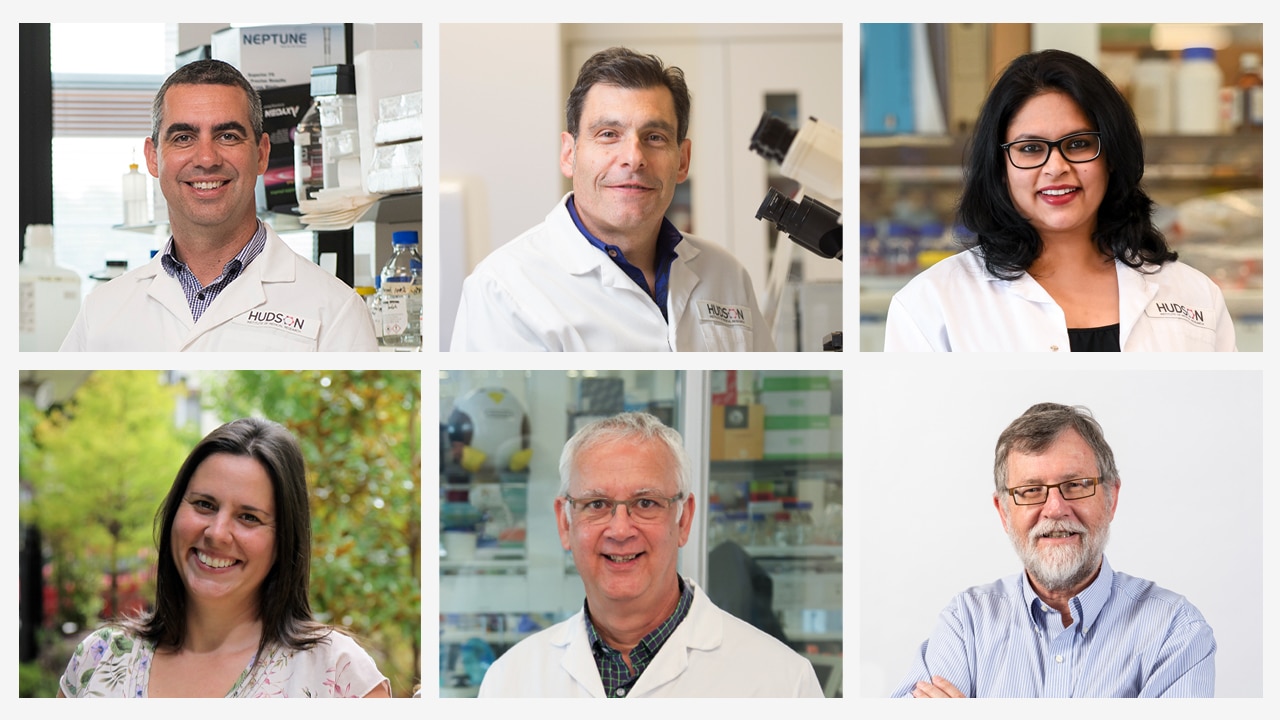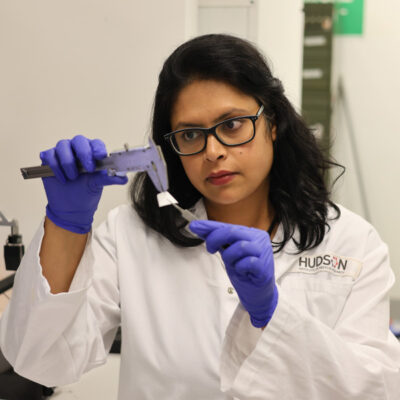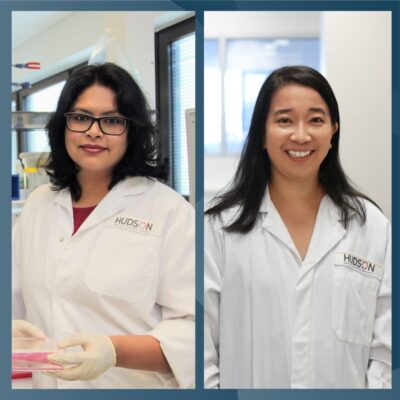Bright ideas attract major funding
By Rob Clancy, staff writer

Hudson Institute researchers have had some great success in the recent NHMRC Grant rounds.
Our researchers have been awarded $8 million for six new NHMRC Ideas Grants to work on research projects ranging from the use of nanotechnology to treat pelvic organ prolapse, new strategies for still birth prevention through to cancer and hypertension.
Our researchers have also been awarded prestigious NHMRC Investigator Grants worth almost $7.5 million for three fellowships covering cancer, perinatal brain injury and the transition of newborn babies from the womb to the world.
NHMRC Ideas Grants

Exploiting epigenetic dysregulation to develop differentiation therapy in solid tumours.
Associate Professor Jason Cain
Lung adenocarcinoma (LUAD) is treated with chemotherapy and immunotherapy which is largely ineffective. The team show LUAD patients may benefit from epigenetic differentiation therapy. This project utilises human and mouse models of LUAD to define the mechanisms of epigenetic differentiation therapy in order identify biomarkers predictive of response, and synergistic therapies. These studies will demonstrate the utility of epigenetic differentiation therapy in LUAD, leading to successful translation.

How H. pylori hijacks the nucleus: A new paradigm for cancer-causing bacteria
Professor Richard Ferrero
Bacterial cell walls are decorated by ‘blebs’, or vesicles, which are released to the surrounding medium during growth. These vesicles play important roles in communication between bacteria and host cells. Vesicles from the stomach bacterium, H. pylori, carry a protein with cancer-causing properties. The proposed research project will demonstrate how these vesicles alter host cell functions, leading to cancer. This research will describe a new mechanism by which bacteria can cause cancer.

Transforming treatment for pelvic organ prolapse with nanotechnology
Dr Shayanti Mukherjee
Pelvic organ Prolapse (POP) is a hidden, debilitating disorder affecting 25 per cent of women causing sexual, bladder and bowel dysfunction. POP is the herniation of the uterus, bladder, or bowel into the vagina due to childbirth injury. Surgical treatment often fails and the use of vaginal mesh has been banned due to unacceptable side effects. There is no cure and no means to identify early damage. The team is developing novel 3D printed therapies using stem cells and nanotechnology to prevent POP.

Elucidating the role of the endometrium in predicting pregnancy outcomes
Dr Miranda Davies-Tuck
This program of work will uncover the role of the endometrial environment in stillbirth, elucidating the foundation of placental issues and ultimately lead to new strategies and interventions for stillbirth prevention.

Improving the diagnosis of differences of sex development (DSD)
Professor Vincent Harley
Disorders of sexual development (DSDs) are surprisingly common, with an estimated frequency of one per cent. However, half of DSD cases remain genetically undiagnosed. The team will identify new causes of DSD. The DNA from patients will be sequenced and patient-specific cell culture systems developed to understand alterations in sex development. The team expect to identify novel DSD genes which will be incorporated into DSD panels globally to raise diagnostic yield, which is currently at 40 per cent.

Molecular and functional dissection of mineralocorticoid receptor signalling
Professor Peter Fuller
The steroid hormone aldosterone controls salt balance and hence, blood pressure. It also has been shown to have a significant role in cardiac failure. Although drugs that block the aldosterone receptor are beneficial in the treatment of heart failure, they are limited by potassium retention in the kidney. In order to develop tissue-specific blockers of the aldosterone receptor, it is necessary to identify mechanisms by which the receptor can be activated and/or blocked in these tissues.
Hudson Institute congratulates all this year’s recipients of NHMRC Ideas Grants.
Funders | National Health and Medical Research Council (NHMRC)
- Cancer
- Pelvic organ prolapse (POP)
- Stillbirth
- Women’s and Newborn health
- Hormone disorders
- Endocrine hypertension
- Intersex conditions
- Infertility
- Lung cancer
- Stomach cancer
In this article
-
 Associate Professor Jason Cain
Associate Professor Jason Cain
Developmental and Cancer Biology -
 Professor Richard Ferrero
Professor Richard Ferrero
Gastrointestinal Infection and Inflammation -
 Associate Professor Shayanti Mukherjee
Associate Professor Shayanti Mukherjee
Translational Tissue Engineering -
 Associate Professor Miranda Davies-Tuck
Associate Professor Miranda Davies-Tuck
Epidemiology and Clinical Trials -
 Professor Vincent Harley
Professor Vincent Harley
Sex Development -
 Professor Peter Fuller AM
Professor Peter Fuller AM
Steroid Receptor Biology
About Hudson Institute
Hudson Institute’ s research programs deliver in three areas of medical need – inflammation, cancer, women’s and newborn health. More
Hudson News
Get the inside view on discoveries and patient stories
“Thank you Hudson Institute researchers. Your work brings such hope to all women with ovarian cancer knowing that potentially women in the future won't have to go through what we have!”




